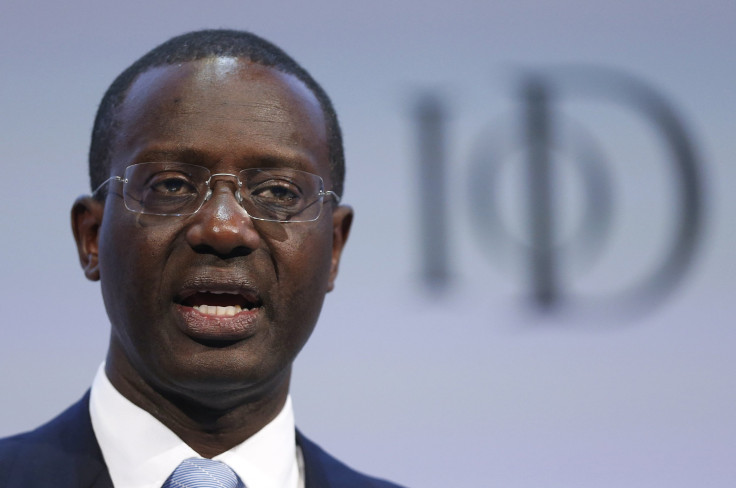Credit Suisse CEO Ousted In The Wake Of Bizarre Espionage Scandal

KEY POINTS
- Tidjane Thiam joined Credit Suisse in 2015 and accomplished a turnaround at the bank
- Iqbal Khan quit Credit Suisse to join rival UBS
- Thiam had the support of some major shareholders
The embattled chief executive officer of Credit Suisse Group (CS) Tidjane Thiam has resigned after losing a power struggle with the board of directors over a bizarre case of corporate espionage.
Thiam, a French-Ivorian who took over the Swiss bank in 2015, claimed he was unaware that Credit Suisse had placed two former employees under surveillance last year.
"I had no knowledge of the observation of two former colleagues,” Thiam said in a statement. "It undoubtedly disturbed Credit Suisse and caused anxiety and hurt. I regret that this happened and it should never have taken place."
Thiam reportedly found himself at loggerheads with Credit Suisse's chairman Urs Rohner, the man who had the board’s backing and forced Thiam’s departure.
"I have spoken with many [shareholders], also with the big ones. Many have confirmed to me that they support the course of the board of directors," Rohner said.
Reportedly, Thiam had the backing of some major Credit Suisse shareholders, including Harris Associates, Silchester International Investors and Eminence Capital, but still succumbed to Rohner, who lobbied for backing from the board and other shareholders.
Rohner even had kind words for Thiam after his resignation. “Tidjane has made an enormous contribution to Credit Suisse since he joined us in 2015,” he said. “It is to his credit that Credit Suisse is standing on a very solid foundation and has returned successfully to profit. The board of directors and I wish Tidjane all the best for his future endeavors.”
There may have been other factors behind Thiam’s ouster.
Bloomberg reported that although Credit Suisse earnings have increased over the past three years, its shares have dropped about half of their value over that time.
Thiam will be replaced by Thomas Gottstein, currently head of the bank's Swiss business. Gottstein has been with Credit Suisse since 1999.
Prior to joining Credit Suisse, Thiam served as Ivory Coast's minister of planning and development until a military coup led to his house arrest. He subsequently went to Europe to become head of British financial services firms Aviva Europe and Prudential.
“I am proud of what the team has achieved during my tenure,” Thiam added on Friday. “We have turned Credit Suisse around.”
The spying scandal that eventually brought down Thiam originated when the bank's former chief operating officer, Pierre-Olivier Bouee hired private detectives to monitor its former head of wealth management, Iqbal Khan. An investigation by Swiss authorities brought the matter to public attention last September. Credit Suisse later revealed that its former human resources chief Peter Goerke had also been illegally surveilled.
An initial internal probe cleared Thiam of any wrongdoing in this matter and solely blamed Bouee – but the episode caused embarrassment to Credit Suisse in the otherwise staid world of Swiss banking. Bouee resigned late last year.
Khan, once an ally of Thiam, played a key role in Credit Suisse’s turnaround by making wealth management a core part of the bank’s business as Thiam steered it away from riskier trading activities.
Khan was born in Pakistan and moved to Switzerland as a young boy, joining Credit Suisse's wealth-management division in 2013. The Financial Times reported Khan engineered an 80% increase in divisional profit and helped to attract $46 billion in net new assets from 2016 to 2018.
However, relations between Thiam and Khan became tense and worsened after an alleged altercation between Khan and Thiam’s girlfriend at a cocktail party in January. The trouble between Thiam and Khan had germinated a few years before when Khan bought property next to Thiam’s in the exclusive Herrliberg area of Lake Zurich. Khan and his wife embarked on a long and noisy redevelopment and construction project on their property which greatly annoyed the neighbors, including Thiam. Both Thiam and Khan complained to Rohner about each other’s conduct.
The Financial Times also reported that Khan grew frustrated at Credit Suisse as he did not gain a high profile within the bank and saw no room for advancement.
After Khan switched to archrival bank UBS Group (UBS) last summer, private detectives (under orders from Bouee) started watching him over fears that he would take Credit Suisse clients with him to UBS.
Credit Suisse hired a security firm called Investigo (who hired the detectives) to watch Khan.
At one point Khan noticed the detectives tailing him and confronted them on the streets of Zurich – an episode that further embarrassed Credit Suisse.
In a macabre twist, in late September, the unnamed contractor who hired Investigo to trail Khan on behalf of Credit Suisse committed suicide.
By that point, Credit Suisse found itself in a spiraling scandal that threatened to destroy its brand and reputation.
"It's something of extreme gravity; in Zurich it is becoming a time bomb and you can feel the panic," a large investor in Credit Suisse told the Financial Times at the time. "Both sides have been damaged, but especially Credit Suisse. We have said to the chairman and board they have to provide a clear outcome and explanation; whoever did wrong has to pay.”
© Copyright IBTimes 2025. All rights reserved.





















